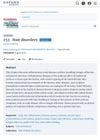Efficacy and Safety of Baricitinib in Managing Severe Alopecia Areata: A 6-Month Real-World Experience
June 2023
in “
British Journal of Dermatology
”
baricitinib alopecia areata Severity of Alopecia Tool SALT score eyebrow regrowth eyelash regrowth nail involvement PHQ-9 GAD-7 DLQI acneiform rash upper respiratory infection vaginal infection creatine kinase dyslipidaemia neutropenia anaemia AA nail improvement depression score anxiety score quality of life score rash respiratory infection cholesterol issues low white blood cells low red blood cells

TLDR Baricitinib was effective and safe for severe hair loss treatment over 6 months.
The study "BH15 Efficacy and safety of baricitinib in the management of severe alopecia areata over a 6-month period: a real-world experience" involved 10 adult patients with severe alopecia areata (AA) who were treated with baricitinib for 24 weeks. The patients' mean age was 34.8 years, and the mean disease duration was 6.1 years. The study found that the Severity of Alopecia Tool (SALT) score significantly decreased at weeks 8, 12, and 24, indicating improvement in hair loss. Additionally, 90% of patients experienced eyebrow/eyelash regrowth. Patients with more recent disease onset responded quicker than those with a more chronic disease course. Nail involvement improved in all patients by week 24. There was also a significant decrease in PHQ-9, GAD-7, and DLQI scores, indicating improvements in depression, anxiety, and quality of life. Adverse events included acneiform rash, upper respiratory infection, vaginal infection, transient raised creatine kinase, dyslipidaemia, and transient neutropenia and anaemia. However, these were mostly transient and did not require treatment. No severe adverse events were noted. The study concluded that baricitinib showed quick onset of action and encouraging results in terms of efficacy at week 24, with an acceptable safety profile.





